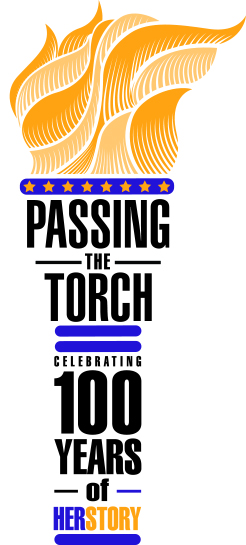By Kristen Taylor, Client Advisor for Mission Wealth Management, active member of FWSF and Co-Executive Producer of Passing the Torch: Celebrating 100 Years of HERstory

As we celebrate the 100th anniversary of the passage of the 19th Amendment that guarantees and protects women's constitutional right to vote, we not only have the opportunity to commemorate this incredible milestone at FWSF, but also to honor other milestones for women that it has since inspired and to consider its relevance to the issues of equal rights and gender parity today.
Women have made AMAZING progress toward equality and leadership over the last century, in part thanks to the 70+ years that suffragettes spent fighting for our right to vote, thereby paving the way for 100 years of women’s achievements. This is why celebrating with the Passing the Torch: Celebrating 100 Years of HERstory presentation is so important in remembering how far we have come as well as acknowledging the work we still have to do.
In co-producing Passing the Torch, I learned about so many motivated women who have passed the torch in their own way creating “firsts” across all industries, and to witness the profound momentum it has generated for all women, past, present and future. In seeing how this wave of inspiration has carried through several generations of women so far, I also recognize the continued effort to achieve truly equal rights and equal opportunity for women including the companies leading the charge and initiatives we can follow so that we all rise together.
According to Rosaling Barnett, Ph.D., a senior scholar at the Wellesley Centers for Women at Wellesley College, “Now, for the first time, women are half of the educated labor force and earn the majority of advanced degrees. Women are doing spectacularly well in universities, but as they move up the work ladder, they run into unforeseen biases that can derail them. The higher they go, the harder it gets; they are not making the progress they have a right to expect, given their education and early promise.”
I found Rosaling’s comment to be a helpful summary of where we are today, so I have broken down five topics that remain a priority for further progress and change for women:
I know we’re not talking about quick fixes, or even easy conversations, to reverse old patterns and structures, but the past 100 years are a reminder that women will confidently press on and never give up on what we feel is right and just. In many cases simply promoting more awareness of the differences is a great first step to help others to see the unintentional patterns of inequality, and therefore work together to rewrite policies, biases and perceptions for a more equitable workplace and world for women and men.